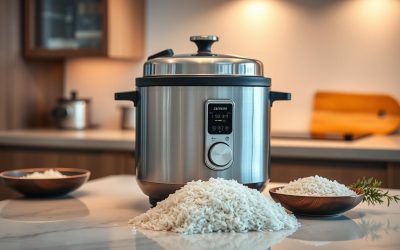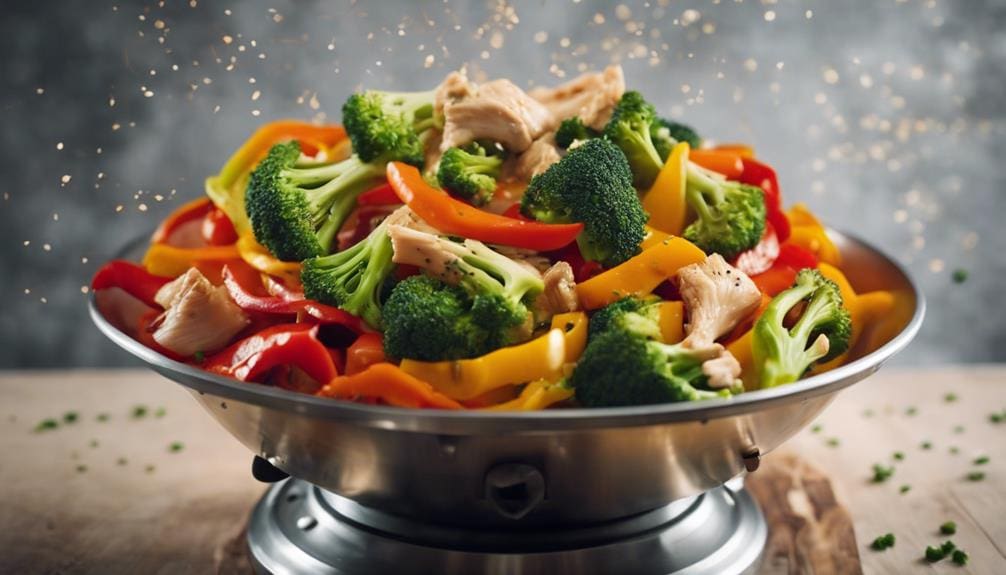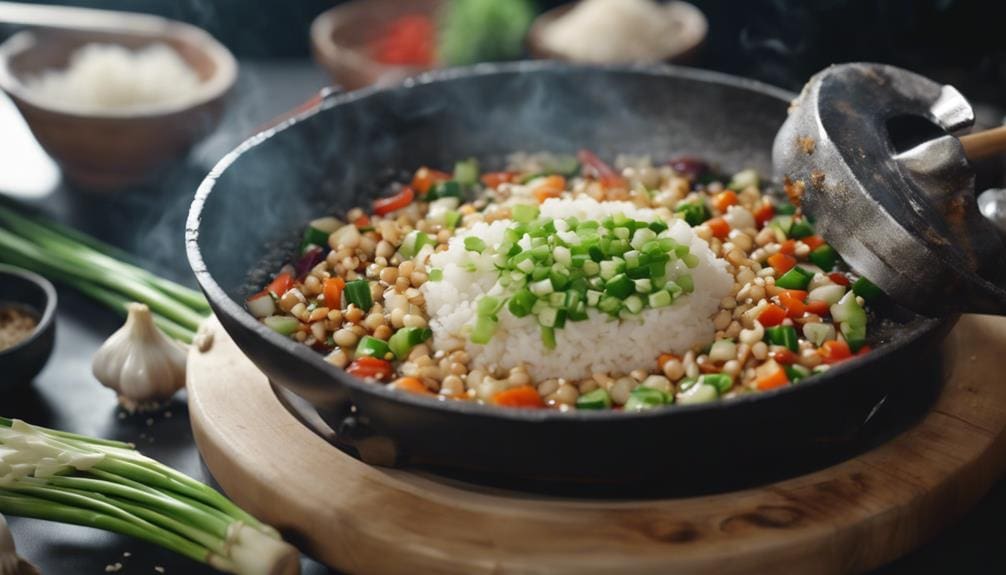Yes, you can definitely cook sushi rice in a rice cooker. The process is simple and efficient, allowing you to achieve perfectly cooked rice for your favorite sushi dishes.
By following the right steps and using the correct water-to-rice ratio, you can easily prepare delicious sushi rice using a rice cooker.
Key Takeaways
Cooking sushi rice in a rice cooker is a convenient and reliable method that ensures consistent results. To prepare the sushi rice properly, begin by washing the rice to remove excess starch. Next, follow the correct rice-to-water ratio and season the rice with vinegar, sugar, and salt for an authentic flavor.
For optimal results, use the dedicated sushi rice setting on your rice cooker. This setting is specifically designed to cook sushi rice to perfection. Once the sushi rice is cooked, store any leftovers in a freezer-safe container to maintain freshness for future use.
When reheating sushi rice, use the microwave at 70% power to preserve its texture and flavor. This gentle reheating method will help prevent the rice from becoming too dry or sticky.
By following these steps and utilizing your rice cooker's sushi rice setting, you can easily prepare delicious sushi rice at home.
Benefits of Cooking Sushi Rice in Rice Cooker
Cooking sushi rice in a rice cooker revolutionizes your culinary experience by offering unparalleled convenience and consistent results.
The rice cooker comes with specialized settings for sushi rice, ensuring optimal cooking conditions every time you cook.
Say goodbye to the hassle of monitoring and stirring on the stovetop – simply add rice and water, choose the appropriate setting, and let the rice cooker do the rest.
This kitchen appliance also features a built-in timer to prevent overcooking or burning, resulting in perfectly sticky and well-cooked rice with the ideal texture for your delicious sushi rolls.
Proper Rice-Water Ratio for Sushi Rice
When it comes to cooking sushi rice in a rice cooker, nailing the proper rice-water ratio is crucial. Getting this ratio right guarantees that your sushi rice turns out just the way you love it – perfectly fluffy and sticky.
Stick around for some helpful tips on achieving that ideal texture for your homemade sushi!
Rice-Water Ratio Importance
Achieving the perfect texture and consistency of sushi rice cooked in a rice cooker hinges on getting the rice-water ratio just right. The balance between the amount of rice and water used is crucial in creating the ideal sushi rice.
A general rule of thumb is to maintain a 1:1 ratio of rice to water when preparing sushi rice in a rice cooker. Adding too much water can result in mushy rice, while too little water may leave the grains undercooked.
The magic of sushi rice lies in striking the correct rice-water ratio, yielding a fluffy, sticky texture that's perfect for crafting delicious sushi rolls. Following the recommended measurements and guidelines for the rice-water ratio sets the stage for success in preparing top-notch sushi rice in your rice cooker.
Achieving Ideal Texture
Achieving the perfect texture for your sushi rice involves mastering the ideal rice-water ratio in your rice cooker. Follow these crucial steps for achieving the desired outcome:
- Use a 1:1 ratio of sushi rice to water in your rice cooker to achieve a fluffy and sticky texture.
- Maintain this consistent ratio regardless of the quantity of sushi rice you're preparing.
- Adjust the rice-water ratio slightly based on the amount of seasoned sushi rice being cooked for optimal results.
- Precision in measuring the water each time is key to ensuring the perfect texture of your sushi rice.
Tips for Perfect Sushi
Achieving the perfect texture for your sushi rice begins with getting the rice-water ratio just right in your rice cooker. A key rule for sushi rice is to use a 1:1 ratio of rice to water. This balance ensures that your rice isn't too mushy or too firm, resulting in a fluffy and sticky consistency ideal for sushi rolls and nigiri.
To enhance the flavor of your sushi rice, consider adding seasoned rice vinegar for a subtle tang that complements the other ingredients. Adjust the water amount based on the quantity of rice to maintain consistency and achieve that perfect sushi rice every time.
Washing Sushi Rice Before Cooking
Before you start cooking sushi rice in your rice cooker, remember the important step of washing the rice.
Importance of Washing
Washing sushi rice is a crucial step in the preparation process, as it significantly impacts the final texture and quality of the rice. Here's why washing sushi rice is essential:
- Improved Texture: Washing sushi rice removes excess starch, leading to a lighter and fluffier texture once cooked.
- Enhanced Stickiness: Properly washed sushi rice results in a stickier consistency, which is vital for shaping and binding sushi rolls.
- Prevention of Clumping: Washing the rice before cooking prevents grains from sticking together and forming clumps during the cooking process.
- Overall Quality: By washing the rice thoroughly, you ensure even cooking and achieve a refined and distinct grain texture in your sushi rice.
Ensure to wash your sushi rice diligently to optimize its potential and elevate the overall sushi-making experience.
Rice Water Ratio
Mastering the perfect consistency of sushi rice in your rice cooker relies on understanding the ideal rice water ratio. To ensure your sushi rice is fluffy, sticky, and flavorful, start by thoroughly rinsing the rice until the water runs clear. This process eliminates excess starch, preventing the rice from clumping together and becoming overly sticky while cooking.
Maintaining a 1:1 ratio of rice to water in your rice cooker is crucial for achieving the desired texture of sushi rice. By properly washing the sushi rice before cooking, you enable it to absorb water uniformly during the cooking phase, resulting in a uniform and delightful texture.
Seasoning Sushi Rice After Cooking
Enhancing the flavor of sushi rice after cooking involves delicately infusing a mixture of rice vinegar, sugar, and salt into the grains.
To achieve the perfect result:
- Gently fold the sushi vinegar, sugar, and salt mixture into the cooked rice to evenly distribute the flavors without breaking the rice grains.
- Be cautious not to overmix the seasoned vinegar into the rice to maintain its desirable texture.
Properly seasoned sushi rice is crucial for creating authentic and flavorful sushi dishes.
Seasoning sushi rice after cooking adds a delightful blend of tangy, sweet, and savory notes to complement other sushi ingredients perfectly.
Rice Cooker Settings for Sushi Rice
When preparing sushi rice in a rice cooker, it's crucial to select the right settings to ensure the best outcome. For optimal results, look for a rice cooker with a dedicated sushi rice setting, such as those found in popular models like Zojirushi or Tiger. These specialized settings are designed to enhance the flavor and texture of the rice, replicating the authentic taste of sushi rice.
Here is a breakdown of the rice cooker settings tailored for sushi rice:
- Sushi Rice Setting: Specifically crafted for sushi rice, this setting guarantees the rice is cooked to perfection, maintaining the ideal consistency and flavor for your sushi dishes.
- White Rice Setting: A basic option for cooking white rice, which can be used as an alternative if a specific sushi rice setting isn't available on your rice cooker.
- Quick Cook Setting: This rapid cooking option comes in handy for situations where time is of the essence, allowing you to prepare the rice quickly.
- Delay Timer Setting: Ideal for setting a delayed start time, enabling you to have the rice ready precisely when you need it, making meal planning more convenient.
Tips for Perfect Sushi Rice Texture
To achieve a perfect sushi rice texture, it's crucial to rinse the sushi rice thoroughly until the water runs clear to eliminate excess starch, resulting in a sticky consistency.
Here are some tips to help you attain the ideal sushi rice texture:
- Thorough Rinsing: Rinse the sushi rice meticulously to remove excess starch and ensure a sticky texture.
- Utilize a Rice Cooker: Employ a rice cooker with precise water and rice measurements to consistently achieve the perfect sushi rice consistency.
- Proper Seasoning: After cooking, season the sushi rice with a blend of rice vinegar, sugar, and salt to enhance its authentic flavor.
- Gentle Mixing: When incorporating the seasoning, gently fold it into the rice to evenly distribute it without excessive mixing, which could lead to mushy rice.
Storage Tips for Leftover Sushi Rice
To maximize the shelf life of leftover sushi rice and explore diverse culinary options, try these storage suggestions. Leftover sushi rice can be stored in an airtight container in the refrigerator for up to three days.
For longer storage, freezing it in a freezer-safe container preserves its freshness for up to two months.
When reheating the sushi rice, use the microwave at 70% power to retain its texture.
This stored rice can be used to craft delectable sushi bowls, rolls, or other rice-based dishes, offering a versatile way to savor its flavors.
Frequently Asked Questions
Is a Rice Cooker Good for Sushi Rice?
Using a rice cooker for sushi rice is an excellent choice. It ensures the perfect texture and consistency every time you prepare this Japanese delicacy. Many chefs and home cooks appreciate the ease and reliability that a rice cooker provides in making sushi rice. Let the rice cooker simplify the cooking process for you, guaranteeing delicious results for your sushi dishes.
How Much Water Do You Put in a Rice Cooker for Sushi Rice?
Achieving the perfect sushi rice in a rice cooker requires a precise 1:1 ratio of water to rice. This specific measurement ensures that the rice grains are fluffy and distinct from each other, ideal for sushi preparation. It's important to adjust the amount of water based on the quantity of rice used to achieve the desired texture. Simply follow these steps for successful sushi rice every time!
Can You Cook Sushi Rice Like Regular Rice?
Cooking sushi rice like regular rice requires attention to detail and the right ingredients. The key is to use high-quality Japanese short-grain rice, ensuring authenticity in your sushi dishes. When using a rice cooker, maintaining the proper rice-to-water ratio and seasoning is crucial for consistently achieving perfectly cooked grains. By following these steps, you can create sushi rice that meets the standards of traditional Japanese cuisine.
Can I Cook Japanese Rice in a Rice Cooker?
Cooking Japanese rice in a rice cooker is a convenient and efficient way to prepare perfect sushi rice. The rice cooker is specifically designed to ensure the ideal texture and consistency for sushi rice. By following the instructions provided with your rice cooker and using high-quality Japanese rice, you can easily achieve delicious results.
To prepare the sushi rice, follow the precise measurements recommended for water and rice in your rice cooker. Once the rice is cooked, season it with a mixture of vinegar, sugar, and salt to enhance the flavor and authenticity of your sushi. This traditional seasoning blend is essential for creating the distinctive taste of sushi rice.
For those looking to explore more advanced techniques in sushi making, experimenting with different types of Japanese rice and adjusting the seasoning to suit personal preferences can add a creative touch to your sushi dishes. Additionally, exploring the cultural significance and history of sushi rice preparation can deepen your appreciation for this beloved Japanese culinary tradition.
Conclusion
Cooking sushi rice in a rice cooker isn't just feasible, but also highly convenient and dependable. By following the right steps like ensuring the appropriate rice to water ratio, meticulously washing and seasoning the rice, and utilizing the specific settings on your rice cooker, you can consistently achieve impeccably cooked sushi rice.
Bid farewell to uncertainties and welcome the delightful homemade sushi rice made effortlessly with the assistance of your reliable rice cooker!


